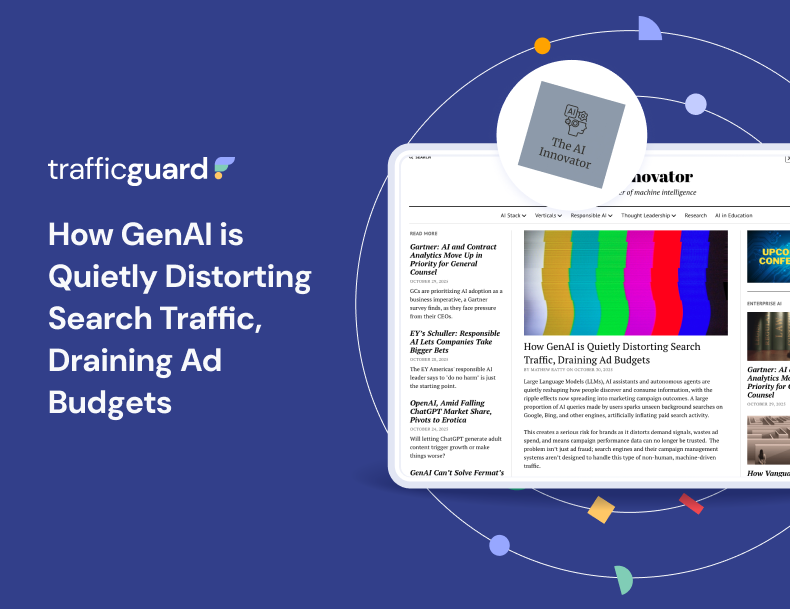Artificial intelligence in advertising

These comments from TrafficGuard’s Chief Operating Officer, Luke Taylor originally appeared in a series of articles on Artificial Intelligence by Disruptor Daily.
What’s The Future Of AI In Advertising?
As the skills gap closes, AI will see much more widespread adoption. Right now, the availability of skills, the time factor of data collection, and tech stack/business compatibility are mediating adoption. Companies that are able to overcome these mediating factors are motivated to achieve exceptional performance by being the first in this new frontier. At some point in the next 10 years, I expect that a critical point will be reached whereby businesses need to be using AI in order to stay competitive. At that point, the motivation will be survival and AI will deliver minimal viable performance. But that point is still some time away. Read the full article.
What Benefits Does AI Bring To Advertising?
The # 1 benefit is AI’s ability to, directly and indirectly, create a better advertising experience. There are all the obvious applications of data and AI to get better and faster decisions and greater personalization for an increasingly relevant and valuable advertising experience for both advertisers and internet users. But indirectly, the use of AI frees up resources to pursue higher-value activities. Manual, time-consuming tasks can be unburdened from human resources allowing them to look for new opportunities and advertising strategies to drive performance. Read the full article.
What Challenges Face AI Adoption In Advertising?
Complete and substantial data is the foundation of AI. The benefit of AI is in its ability to process highly dimensional data for fast, accurate and actionable insight. To collect the volumes of data required to train ML models and drive the success of AI applications takes time. The time it takes to collect this data is the limiting factor that will determine when an organization is ready to leverage AI, and the effectiveness of their AI solutions once implemented.
An additional and related challenge is data privacy due to the nature and volume of data being processed. The regulatory environment around privacy is very active and with increasing AI/ privacy literacy, consumers are also concerned. A survey conducted by the World Economic Forum found 41% of global internet users had a degree of concern around the use of AI. Businesses leveraging AI for digital advertising need to diligently adhere to privacy regulations and ensure data is stored and processed securely. Read the full article.
Which Trends Are Shaping AI’s Role In Advertising Today?
Accessibility is the key driver of AI in advertising this year. There are more ways than ever to incorporate AI into your tech stack – be that with the development of your AI solutions, incorporation of higher-level commercial solutions, or utilizing any of an increasing array of SaaS products with AI capabilities.
While technology has made infrastructure for AI more economical, there has been a lag in skills development that is closing more and more every year. As skills and tech become more available, it will become easier for businesses to incorporate AI into their tech stacks.
With a greater number of AI use cases, businesses can see the value AI will deliver to their business functions, driving demand for AI solutions. Performance optimization is the number one goal – AI promises to help optimize their ad spend, facilitate content personalization and localization, drive targeting and segmentation, and improve traffic quality. Read the full article.
What’s The State Of AI In Advertising Today?
AI in digital advertising has been pioneered by adtech giants Google, Amazon, Facebook, eBay. With access to incomprehensible volumes of data, they have been using AI to optimize their advertising offerings for years and continue to lead the way in its application – with natural language processing (NLP) of Siri, Alexa and Google obvious examples. Until recently, leveraging these platforms was really the only feasible way for advertisers to benefit from AI.
AI has introduced a new level of effectiveness and speed to digital advertising – Using large volumes of data to inform split-second optimization decisions around targeting, media buying, content and copy creation and personalization.
The number of ways to activate AI is growing. Where it was once the purview of those tech giants with resources to operate their own infrastructure and create their own frameworks, the emergence of a greater number of commercial applications has democratized access to AI technology somewhat. Scalable cloud infrastructure makes operations more economical and products like GCP and AWS, reduce the technical resources required to a degree. Read the full article.
Get started - it's free
You can set up a TrafficGuard account in minutes, so we’ll be protecting your campaigns before you can say ‘sky-high ROI’.
At TrafficGuard, we’re committed to providing full visibility, real-time protection, and control over every click before it costs you. Our team of experts leads the way in ad fraud prevention, offering in-depth insights and innovative solutions to ensure your advertising spend delivers genuine value. We’re dedicated to helping you optimise ad performance, safeguard your ROI, and navigate the complexities of the digital advertising landscape.
Subscribe
Subscribe now to get all the latest news and insights on digital advertising, machine learning and ad fraud.







